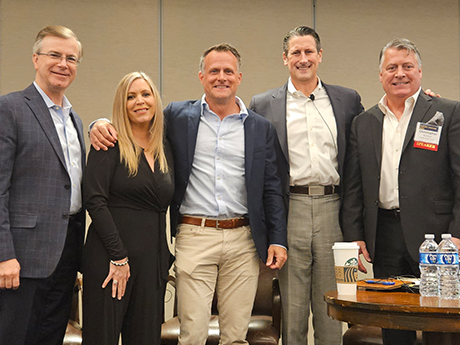LOS ANGELES — If a seniors housing operator is going to survive and thrive in the future, treating front-line staff well is going to be the key to that success.
That’s according to a discussion at France Media’s InterFace Seniors Housing West conference, held Feb. 1 at the Omni Los Angeles. The panel, titled “The Power Panel: CEOs Discuss the State of the Industry,” featured Sean Kelly, CEO, Front Porch; Traci Taylor-Roberts, president, Sodalis Senior Living; Chris Belford, CEO, Sinceri Senior Living; and Isaac Scott, principal, Anthem Memory Care. Michael Coiley, managing director of healthcare finance at First Citizens Bank, moderated the conversation.
Coiley posed an opening question to the panel: “We’ve seen occupancy growth, but what did you do differently? You didn’t just sit in your chair and wait.”
(Across the 31 primary metropolitan markets tracked by the NIC MAP Vision, a product of the National Investment Center for Seniors Housing & Care (NIC), there have been 10 consecutive quarters of occupancy growth. As of the end of the year, private-pay seniors housing occupancy sat at 85.1 percent, an increase of 730 basis points from the pandemic low of 77.8 percent in second-quarter 2021, but still just shy of the pre-pandemic mark of 87.1 percent in first-quarter 2020.)
Scott said the industry received a “psychological chiropractic adjustment” last year. The mindset changed from surviving the aftereffects of the pandemic, rising interest rates and rampant inflation to improving the state of seniors housing overall.
“We had an occupancy goal for the end of 2024 that we set in June,” said Scott. “We exceeded that by the end of 2023. We saw our highest sales in August, September and October.”
The adjustments Anthem made in the middle of 2023 were heavily focused on the employees. They included more recognition and more servant leadership out of the corporate office. Functionally, that meant executives were expected to be visible in the communities, working in the buildings — even “grabbing a paintbrush to make sure our folks knew we were supporting them.”
“Coming out of 2023, you were used to tackling the thing in front of you,” said Scott. “We had an opportunity to take a look up and ask: ‘What can we do to really functionally change the way our business is run?’”
Kelly said that Front Porch underwent a similar mid-year change in 2023, shifting from a focus on simply surviving to one where executives were asking ““What do we need to build to see this thing not only sustain, but thrive?”
“If you want the outcomes you hope for, you have to invest in the people and the processes and the systems,” said Kelly. “This is about delivering — not just to the people that are going to pay rent for services, but to the people you hope will come work with you, stay with you, grow with you. If we’re going to call them heroes, pay them like heroes, and we’re doing that now. But we also have to treat each other with degrees of humanity that go a little bit further than we used to go.”
Belford said that Sinceri recently underwent a rebranding — it was formerly known as JEA Senior Living — and had a chance to look at what was appealing about the company to residents and employees alike. The answer was that it “felt like family.”
“We have to recognize that people come into the industry because they want to take care of older adults,” said Belford. “They want to be treated fairly. They’re not there just to collect a paycheck. They’re there to find meaning and purpose in their lives. Finding that purpose in the industry is what we have to allow them to do.”
In addition to having no turnover in its executive director positions across its 73 communities, Sinceri’s treatment of its employees has allowed the company to eliminate all agency labor (those hired through third-party companies to fill shifts, but not employees of the company).
“That was a big boon for us. Agency staff, they’re real nice people and they want to care for residents like we do. But they don’t know your residents like you do. Getting rid of the agency staff, replacing them with our own and then training up our staff to take care of our residents was really important to us in 2023.”
Taylor-Roberts said that Sodalis didn’t use agency labor even during the pandemic — an extreme rarity — because the company puts such a strong focus on recruiting and retaining employees itself.
“I hired my own in-house recruiters to recruit right off Indeed so we could do it faster and have a faster turnaround,” she said.
She also went on to add that rewards for service, such as gift cards, were certainly appreciated by staff. However, those are “business transactions,” she noted — “you do something for me, I’ll do something for you.” That’s why Sodalis began giving benefits directly to employees, universally and without strings attached.
“We started focusing on loving people, not just appreciating them. There’s a difference,” said Taylor-Roberts. “Love means not expecting anything in return.”
Examples include buying backpacks and school supplies for employees’ children, providing free daycare services and even having a traveling recreational vehicle to provide post-work margarita parties.
“It’s a lot of effort, but as an industry if you want to solve your staffing and keep your margin intact, it’s not just about financials anymore or how your community looks,” says Taylor-Roberts. “It’s going to be about how you treat employees.”
— Jeff Shaw

